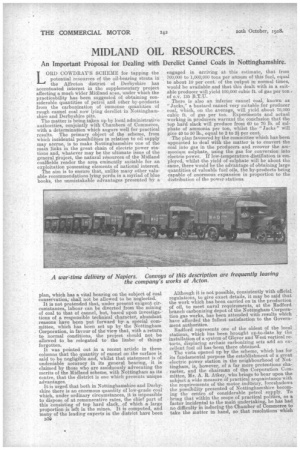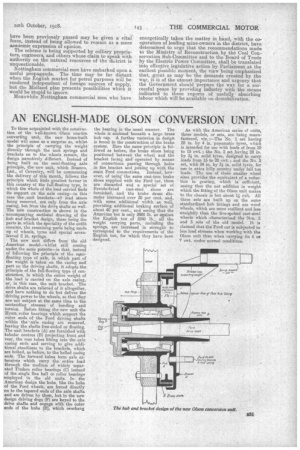MIDLAND OIL RESOURCES.
Page 10

Page 11

If you've noticed an error in this article please click here to report it so we can fix it.
An Important Proposal for Dealing with Derelict Cannel Coals in Nottinghamshire.
IORD COWDRAY'S SCHEME for tapping the potential resources of the oil-bearing strata in I-4 the /Ufreton district of Derbyshire has accentuated interest in the supplementary project affecting a much wider Midland area, under which the practicability has been suggested of obtaining considerable quantities of petrol and other by-products from the carbonization of immense quantities of rough cannel coal now lying derelict in Nottinghamshire and Derbyshire pits.
The matter is being taken up by local administrative authorities, conjointly with Chambers of Commerce, with a determination which augurs well for practical results. The primary object of the scheme, from which incidental possibilities in relation to oil supply may accrue, is to make Nottinghamshire one of the main links in the great chain of electric power stations and, whatever may be the ultimate issue of the general project, the natural resources of the Midland coalfields render the area eminently suitable for an exploitation possessing elements of national interest. The aim is to ensure that, unlike many other valuable recommendations lying perdu in a myriad of blue books, the unmistakable advantages presented by a.
plan, which has a vital bearing on the subject of coal conservation, shall not be allowed to be neglected.
It is not pretended that, under present exigent circumstances, labour can be diverted from the mining of coal to that of cannel, but, based upon investiga-' tions of a responsible technical character, abundant reasons have been put forward bya special committee, which has been set up by the Nottingham Corporation, in favour of the view that, with a return to normal conditions, the project should not be allowed to be relegated to the limbo of things forgotten.
It was pointed out in a recent article in these columns that the quantity of cannel on the surface is said to be negligible and, whilst that statement is of undeniable accuracy in its general bearing, it is claimed by those who are assiduously advocating the merits of the Midland scheme, with Nottingham as its centre, that the district is one which presents unique advantages.
It is urged that both in Nottinghamshire and Derbyshire there is an enormous quantity of low-grade coal which, under ordinary circumstances, it is impossible to dispose of at remunerative rates, the chief part of this consisting of top hard slack, of which a large proportion is left in the mines. It is computed, and many-of the leading experts in the district have been
B30
engaged in arriving at this estimate, that from 700,000 to 1,000,000 tons per annum of this fuel, equal to about 10 per cent. of the output in normal times, would be available and that this dealt with in a suitable producer will yield 100,000 cubic ft. of gas per ton • of c.v. 135 B.T.U.
There is also an inferior cannel coal, known as " Jacks " a bastard cannel very suitable for producer coal, "Jacks," on the averagewill yield about 70,000 E on the averagewill yield about 70,000 E cubic ft. of gas per ton. Experiments and actual working in producers warrant the conclusion that the top hard slack will produce from 60 to 70 lb. of sulphate of ammonia per ton, whilst the " Jacks " will give 40 to 50 lb., equal to 2 to 24 per cent.
The plan favoured by the committee which has been appointed to deal with the matter is to convert the coal into gas in the producers and recover the amauonium sulphate, using the gas for conversion into electric power. If low-temperature distillation is employed, whilst theyield of sulphate will be about the same, there would be the advantage of obtaining large quantities of valuable fuel oils, the by-products being capable of enormous expansion in proportion to the distribution of the power stations.
Although it is not possible, consistently with official regulations, to give exact details, it may be said that the work which has been carried on in the production of oil, to meet naval requirements, at the Radford branch carbonizing depot of the Nottingham Corporation gas works has been attended with results which have afforded works, fullest satisfaction to the Govern ment authorities.
Radford represents one of the oldest of the local stations, which has been brought up-to-date by the installation of a system of Glover and West vertical retorts, displacing archaic carbonizing sets and an excellent fuel oil has 'been there obtained. The vista opened up by the scheme, which has for its fundamental purpose the establishment of a great electric power station in the neighbourhood of Nottingham, is, however, of a far more pretentious character, and the chairman of the Corporation Coinmittee, Mr. A. R. Atkey, who brings to bear upon the subject a wide measure of practical acquaintance with the requirements of the motor indristry, foreshadows the possibility presented of Nottinghamshire becoming the centre of considerable petrol supply. To bring that within the scope of practical politics, as a factor incidental to the main undertaking, he has had no difficulty in inducing the Chamber of Commerce to take the matter in hand, so that resolutions which
have been previously passed may be given a vital force, instead of being allowed to remain as a mere academic expression of opinion. The scheme is being supported by colliery proprietors, engineers, and others whose claim to speak with authority on. the natural resources of the diArict is unquestionable.
Nottingham commercial men have embarked upon a useful propaganda. The time may be far 'distant when the English market for petrol purposes will be rendered independent of foreign sources of supply, but the Midland plan presents possibilities which it would be stupid to ignore. Meanwhile Nottingham commercial men who have energetically taken the matter in hand, with the cooperation of leading mine-owners in the district, have determined to urge that the recommendations made. to the Ministry of Reconstruction, by the Coal Conservation Sub-Committee and to the Board of Trade by the Electric Power Committee, shall be translated into effective legislative action by Parliament at the earliest possible moment, the view being emphasized that, great as may be the demands created by the wkr, it is of the utmost importance and urgency that the Government should prepare the way for a successful peace by providing industry with the means indicated in these reports of usefully absorbing labour which will be available on demobilization.






















